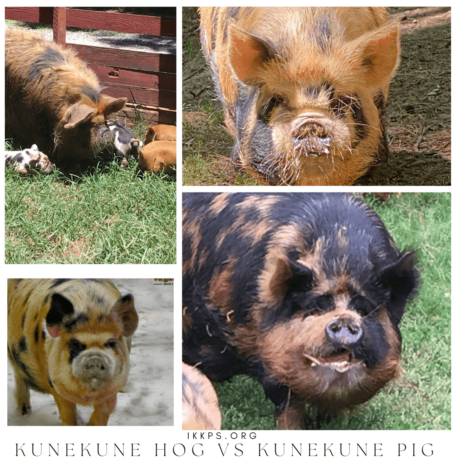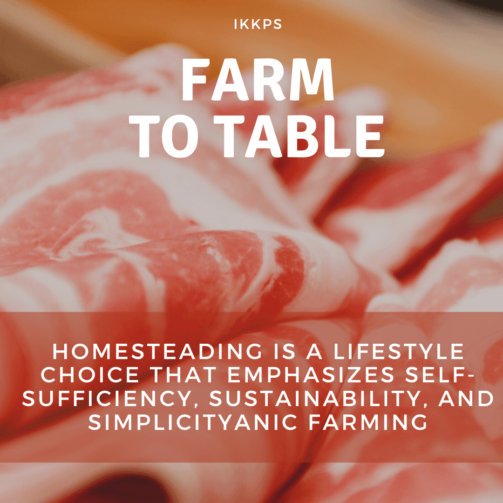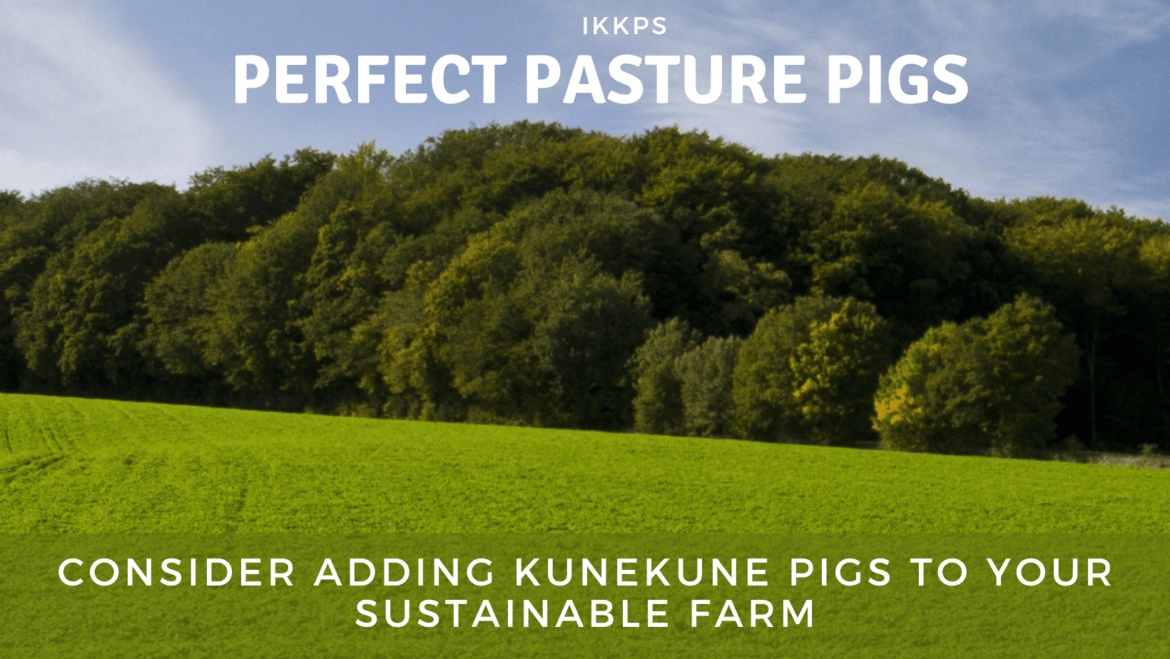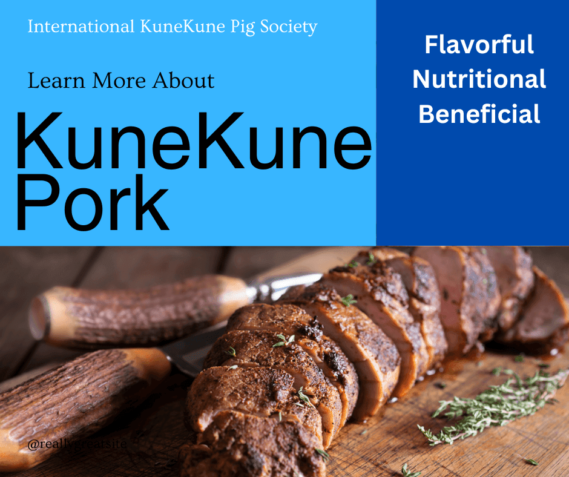
Sign Up
Want to receive a newsletter to learn more about KuneKune pigs and other educational information? Sign up to have them delivered right to your inbox.
We look forwarded to sending you some great info.

What is a KuneKune Hog?
KuneKune Hog verses KuneKune Pig
Have you heard the term KuneKune Hog? In this article, we will explore the difference, if any, between the KuneKune Hog and the KuneKune Pig to fully understand the difference. Then we will dive into Why the KuneKune Pig is the Perfect Addition to Your Sustainable Farming Plan.
What is the difference between a KuneKune Hog and a KuneKune pig?
I am sure that you have heard of the term KuneKune Hog as well as the KuneKune Pig. So, what is the difference between the two? Today we are going to explore that a bit further and see where KuneKune Hog's term may have come from.
Terminology
Definitions according to Mariam Webster Dictionary
Pig: a young, domesticated swine usually weighing less than 120 pounds or a wild or domesticated swine regardless of age or weight
Hog: a domesticated swine especially when weighing more than 120 pounds or any of various animals related to the domesticated swine
In general what the term pigs and hog mean.
The animal kingdom is filled with fascinating creatures that vary in size, shape, and appearance. Among the many creatures that captivate us are the hog and the pig. While these terms are often used interchangeably, there are key differences between hogs and pigs that are worth understanding. By examining their physical characteristics, behavior, and usage, one can gain a comprehensive understanding of the distinction between the two.
Physically
hogs and pigs can be distinguished primarily by their sizes. Pigs are small to medium-sized animals, typically weighing between 100 to 300 pounds. They have compact bodies, short legs, and a round snout. On the other hand, hogs are significantly larger, often weighing over 300 pounds (136 kilograms), and can even reach up to 700 pounds (317 kilograms) and more for commercial hogs. Hogs have long and slender bodies, a strong build, longer legs, and a distinct longer snout. These differences in size and physical attributes make hogs easily distinguishable from their smaller counterparts, the pigs.
Behaviorally
Pigs and Hogs differ in their behavior and habitat. Pigs are domesticated animals and are commonly found on farms, where they are kept for their meat or used for agricultural purposes. They are known for their friendly and social behavior, easily forming connections with humans and other animals. Pigs are highly intelligent animals and possess a playful nature that makes them endearing creatures to interact with.
On the other hand, hogs are wild animals or ones that are usually referred to as commercial hog breeds that typically inhabit forests and woodlands. They have a solitary nature and tend to be more aggressive, and territorial compared to their domesticated counterparts. Their behavior is adapted to living in the wild, often using their large tusks for rooting the ground in search of food or as a defense mechanism when threatened. Due to their wild nature and potentially harmful behavior, hogs are less commonly seen in human-populated areas and require specific management in the wild.

Uses
Another distinguishing factor between hogs and pigs lies in their usage and significance to humans. Pigs have long been domesticated for their meat and other byproducts. They are one of the most commonly consumed types of meat globally and are used to produce various pork-based products. Additionally, pigs have played a key role in cultural traditions and religious ceremonies throughout history. In some regions, pigs are considered sacred animals while in others, they are symbols of fortune and prosperity.
In the wild, they serve as an important aspect of ecosystems, playing a role in seed dispersal and nutrient cycling. However, hogs can also cause ecological problems, particularly when introduced to non-native habitats, where they can damage ecosystems and agricultural fields due to their rooting behavior.
In summary
While hogs and pigs share commonalities, they are distinct in size, behavior, and usage. Understanding the differences between them is essential to appreciate their unique characteristics and roles. Pigs, being smaller, domesticated animals, provide companionship to humans, contribute to the food industry, and have cultural significance. In contrast, hogs are larger, wild animals, or commercial hog breeds living more solitary, and play a specific role within ecosystems. By honoring and respecting these differences, we can embrace the diverse and captivating aspects of the animal kingdom.
How the term KuneKune hogs started
One of the KuneKune Registries is where this started. They are based in Canada. They are focused on a larger pig and one that is widely recognized as a meat animal. The terminology change was geared more toward serious consideration and promotion of KuneKune meat, larger pigs, and a bit faster growth. They are striving for selective breeding of a larger pig they call KuneKune hogs. The goal is for sows to reach 400 lbs. and boars to reach 500 lbs. This is the information publicly available on their website.
That being said, is this wrong? Well, no! Since you can see that the term is frequently used interchangeably KuneKune Hog and KuneKune Pig mean the same thing. It is simply different from what we usually hear and read about.
How the Registries use the terms.
Each breed registry chooses the term they prefer whether it be KuneKune Pig or KuneKune Hog. The New Zealand KuneKune Society, where the pigs originated call them KuneKune Pigs. The British KuneKune Pig Society calls them KuneKune pigs. The other USA-based registry calls them KuneKune pigs. Based on these other 3 registries and the IKKPS, you will hear it more often as KuneKune pigs. The one registry that uses KuneKune hogs is based in Canada.
Now that we have all that out of the way let us get to our article. We will use both KuneKune Pig and KuneKune Hog in this article so you can easily see how they can be used interchangeably when discussing our beloved KuneKune pig.
Building Your Dream Homestead: Why the KuneKune Pig is the Perfect Addition to Your Sustainable Farming Plan

Are you looking to build your dream homestead with sustainable farming practices? Then you will need the perfect addition to your farm - the KuneKune hog. These adorable pigs are not only a joy to have around, but they also bring a multitude of benefits to your farm. With their small size and friendly nature, KuneKune pigs are ideal for small-scale farming operations.
One of the key advantages of raising KuneKune pigs is their ability to thrive on pasture and forage. These pigs possess a natural ability to graze, which means they require less concentrated feed and can help reduce the cost of feed bills. Additionally, their grazing habits contribute to efficient land utilization and soil improvement, making them an eco-friendly choice for sustainable farming.
Another advantage is their docile and friendly temperament, which makes them easily manageable even for those with limited experience in pig farming.
KuneKune pigs are known for their sweet and gentle demeanor, making them a favorite among families and children.
Whether you are looking to start a small-scale sustainable farm or simply want a new addition to your homestead, the KuneKune Pig is an excellent choice. Discover why these charming pigs are the perfect fit for your farming goals and get ready to reap the rewards of their presence on your land.
What is homesteading and its history?
Homesteading is a term that has gained popularity in recent years, especially in the context of sustainable living and self-sufficiency. It refers to a lifestyle in which
individuals or families pursue a simpler way of life, often by living off the land. Homesteading encompasses various aspects, including agriculture, animal husbandry, and gardening, as well as skills like canning and preserving food, making homemade products, and minimizing waste. Let us delve into the concept of homesteading, its history, and its significance in today's world.
American History
The concept of homesteading originated in the early 19th century in the United States, when the government offered vast parcels of land to settlers, encouraging them to build homes, farm the land, and develop communities. This initiative aimed to stimulate westward expansion and populate the frontier regions of the country. Homesteaders, also known as settlers or pioneers, were required to cultivate the land for a specified period, usually five years, after which they could own it. This opportunity attracted many individuals seeking a fresh start, economic independence, and the chance to build a life based on their efforts.
Over time, the idea of homesteading evolved beyond government initiatives and became associated with self-sufficiency, simplicity, and sustainability. Today,
homesteaders adopt practices that align with these values, seeking to reduce their dependence on external systems and resources, such as grocery stores and
utilities. They strive to provide for themselves and their families by growing their food, raising livestock or poultry, and harnessing renewable energy sources like solar power or wind turbines. Many homesteaders also engage in traditional skills like knitting, sewing, woodworking, and carpentry to create their clothing, furniture, and tools.
In summary
In conclusion, homesteading is a lifestyle choice that emphasizes self-sufficiency, sustainability, and simplicity. Originating from the early settlement of the American frontier, it has evolved into a movement embraced by people worldwide. Homesteaders take pride in growing their food, raising animals, and engaging in traditional skills to reduce their dependence on external systems and resources. With its numerous benefits on personal, environmental, and societal levels, homesteading offers an alternative way of living that promotes a stronger connection to the land, strives for environmental stewardship, and fosters resilient local communities.
The benefits of homesteading
Homesteading has become increasingly popular in recent years, with an increase in the number of people seeking a self-sufficient and sustainable way of life. The benefits of homesteading are numerous, from providing fresh and organic food for your family to reducing your carbon footprint. By growing your fruits and vegetables, raising livestock, and utilizing renewable energy sources, you can create a more sustainable and environmentally friendly lifestyle.
What is a KuneKune hog or KuneKune pig?
Before diving into the advantages of raising KuneKune hogs, let us first understand what these unique pigs are. Originating from New Zealand, KuneKune pigs are a small breed of domestic pig that has become increasingly popular for their suitability in sustainable farming. They are known for their short legs, round bodies, and distinctive wattles that hang from their lower jaws. KuneKune hogs, or KuneKune pigs, come in a variety of colors, including black, ginger, brown, spotted pigs, and cream, making them a visually appealing addition to any farm.
The characteristics and advantages of KuneKune Hogs
One of the key advantages of raising KuneKune pigs is their ability to thrive on pasture and forage. These pigs possess a natural ability to graze, which means they require less concentrated feed and can help reduce the cost of feed bills. Unlike other pig breeds that primarily rely on grain-based diets, KuneKune hogs can be raised on a forage-based diet, making them an economical choice for sustainable farmers.
Additionally, their grazing habits contribute to efficient land utilization and soil improvement, making them an eco-friendly choice for sustainable farming. KuneKune pigs have a gentle and careful grazing style, which helps prevent overgrazing (provided they have ample space) and promotes healthy pasture growth. They also have a positive impact on soil fertility, as their rooting behavior helps aerate the soil and distribute organic matter, leading to improved soil structure and nutrient cycling. It is important to note that KuneKune pigs are not prone to rooting but will root in moist wet areas or the search of grass roots and grubs.
Incorporating KuneKune pigs into your Sustainable Farming Plan
If you are considering adding KuneKune pigs to your sustainable farming plan, there are a few key factors to consider. Firstly, you will need to ensure you have enough pasture and forage available to support your pigs. KuneKune pigs require a minimum of half an acre of well-managed pasture per 4-5 pigs, so it is important to assess the carrying capacity of your land before bringing them in.
In terms of housing, KuneKune pigs have minimal maintenance. They are well-suited to outdoor systems, as long as they have access to shade and shelter. A simple three-sided shed or a sturdy pig ark will provide adequate protection from the elements. This is for adult pigs. Piglets will need more protection, especially in winter farrowing months.
Selling and marketing KuneKune pork products
Once you have successfully raised your KuneKune hogs, you may consider selling their pork products as an additional source of income. The demand for high-quality, locally sourced meat is on the rise, and KuneKune pork can be a valuable addition to your farm's offerings. When marketing your KuneKune pork products, it is important to emphasize their unique qualities, such as their superior taste and texture, as well as their sustainable farming origins. Connecting with local farmers' markets, restaurants, and online platforms can help you reach potential customers who appreciate ethically raised meat.
Learn more about KuneKune Pork
KuneKune Pork Prices
Is KuneKune Pork good?
Nutritional Benefits
Where to Purchase and more

Learn more about KuneKune meat and what makes them the perfect pig for your homestead.
Benefits of utilizing KuneKune meat and more.
Challenges and considerations in raising KuneKune hogs.
While raising KuneKune pigs can be a rewarding experience, it is important to be aware of the challenges and considerations that come with it. One potential challenge is the availability of KuneKune piglets. Due to their growing popularity, finding reputable breeders and securing piglets may require some research and planning. It is important to source your piglets from reputable breeders who prioritize the health and well-being of their animals.
Ensure that your piglets are registered with one or more of the 3 breed registries: IKKPS, AKKPS, or IKHR. Beware of purchasing unregistered KuneKunes as they are
often mixed that unscrupulous breeders are passing off as purebred when in fact they are not and will not have the same characteristics of the beloved KuneKune. This can matter even if you are breeding for meat.
Another consideration is the need for proper healthcare and nutrition. Like all animals, KuneKune pigs require vaccinations and parasite control. It is important to work with a veterinarian experienced in pig care or an experienced KuneKune breeder to ensure the health and welfare of your pigs. Additionally, providing a balanced diet that meets their nutritional needs is crucial for their overall well-being. We have several articles available on this topic to learn more about what KuneKune pigs can and cannot eat.
Conclusion: Why the KuneKune hog is the perfect addition to your sustainable farming plan
Whether you are looking to start a small-scale sustainable farm or simply want a new addition to your homestead, the KuneKune Pig is an excellent choice. With their ability to thrive on pasture and forage, gentle temperament, and positive impact on soil health, KuneKune hogs more often referred to as KuneKune pigs, offer numerous advantages for sustainable farmers. By incorporating these charming pigs into your farming plan, you can enhance the sustainability and productivity of your homestead while enjoying the many benefits they bring. So why wait? Start building your dream homestead with the perfect addition - the KuneKune Pig.
Registry Office
17500 Hamilton Arms Court Dewitt, VA 23840